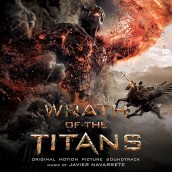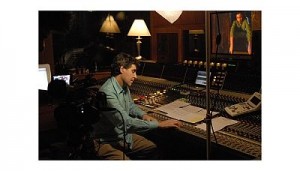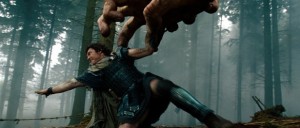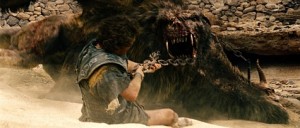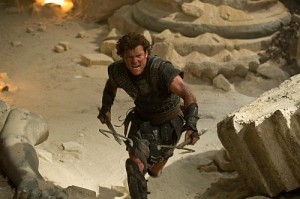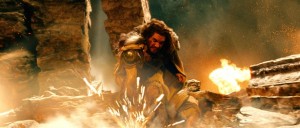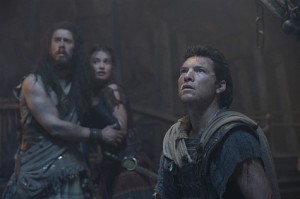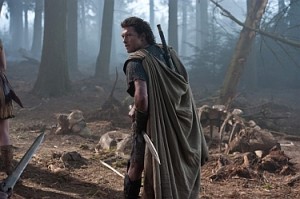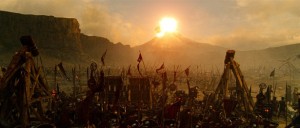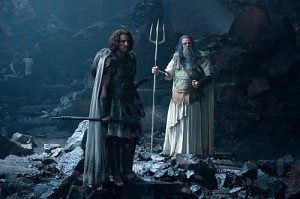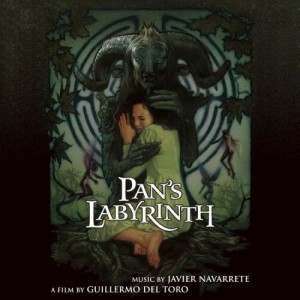In WRATH OF THE TITANS, a menagerie of ancient beasts and angry gods are unleashed upon the world of men, all due to the declining prayers directed at Zeus and his brethren on Mount Olympus. However, Hollywood’s cinematic worship towards ancient Greece’s supreme being, let alone legendary deities in general, is more than boisterous given the current films inspired by the mythic clashes of old. Not only are these pictures a boon for today’s CGI effects wizards to indulge in their Ray Harryhausen-inspired love of stop-motion giant monsters, but they’re equally heaven-sent for composers to unleash the own musically epic tributes to mighty fantasy scoring.
Yet in a pantheon of brassily valiant themes, ancient ethnic instruments, state-of-the-art percussion and the Greco-Roman tongues of the choruses offering praise to gods and men, few of these scores resound with the Zeus-ian power of WRATH OF THE TITANS. For while Perseus is given any array of weapons to take on the world-beaters who’ve risen depths (let alone a flying horse and a beautiful warrior goddess), it’s doubtful he could do the job without the rousing, rampaging score of a Spaniard named Javier Navarrete, a composer well-versed in accompanying creatures from the netherworld, and the heroic fights of humans against them.
While prolific in his home country in far-less monster-filled pictures, Navarrete first gained notice among American genre fans in 2001 for his poignant, spectral score to filmmaker Guillermo del Toro’s THE DEVIL’S BACKBONE’s combination of children, fantastical visitors and del Toro would next garner Navarrete’s melodic, orchestral-accented approach an Oscar nomination for 2006’s PAN’S LABYRINTH. A menagerie of English-language creature-filled movies soon followed with MIRRORS, INKHEART, THE HOLE and THE NEW DAUGHTER, along with the terrifically eccentric ninja western THE WARRIOR’S WAY.
But as stirring as these works were, WRATH OF THE TITANS takes the composer’s talents on the fast elevator to Mount Olympus. Not only do Navarette’s gigantically bold themes capture the conflicted warrior’s heart of an older Perseus, but also any number of distinctively percussive monster matches, the villainous heat of Hades and rousing choral tales of a bigger, better clash of the titans. Navarrete’s thrilling WRATH truly breaks out the stuff of legend, providing enough epic energy to recharge Zeus and friends for a few millennia to come- not to mention landing Navarrete a good shot of finding his place in Hollywood’s blockbuster pantheon of composers.
ASSIGNMENT X: is certainly the most spectacular Hollywood film you’ve scored. How did you come aboard it?
JAVIER NAVARRETE: A good part of the movie was shot in Spain, so there was a lot of Spanish talent involved. At some point the producers and the director thought it could be a good idea to have a Spanish composer on board. Somebody said my name and, a few weeks later, I was introduced to the director Jonathan Liebesman on the set. He thought I was right for the job, and I was in.
AX: Could you tell us about your working relationship with Jonathan?
NAVARRETE: I had an excellent collaboration with him. He first asked me to do a theme immediately after I saw the first ten minutes of movie assembled. What I did then is still in the movie, and became later, even after many changes, the ground for the main themes of the movie. Jonathan is a lover of classic and contemporary scores, and knows very well about them. He played me some excellent stuff in different points of the creative process, but never asked me to do this or that, just to follow my instincts. He was fully supportive of them, and his notes were always realistic and heavily related to the needs of the movie. He asked me to follow the action closely, in a choreographic and classical way, but not to interfering with the musical language I was using to achieve this goal.
AX: How do you think the score tells us how the movie’s characters have changed in the decade since the first CLASH OF THE TITANS?
NAVARRETE: I believe this score might be darker than the first movie’s. There are plenty of reasons for that. Perseus, the main character, is ten years older, a widower who makes a life out of fishing. He goes back to fight in a very reluctant way, only when he sees his son and his village under attack. He doesn’t want to show how good he is, but somebody has to do the job. The starting point of the movie is the Olympian gods loosing their power because humans stopped praying to them. That’s not a bright situation (but please don’t compare this to the world situation nowadays!). Somehow the music has to reflect these feelings. Even without doing it on purpose, they’re going to just be there.
AX: Did Ramin Djawadi’s score for the first CLASH have any bearing on your approach for the sequel
NAVARRETE: Not really, though I admire Djawadi’s work, and CLASH OF THE TITANS in particular. Jonathan didn’t like the idea of being tied to the previous movie though. He wanted to make a point of this one being different. In our first talks, it was clear to me that I didn’t have to deal with themes or ideas of “Clash.” Moreover, Jonathan wanted a very dramatic approach to the score. He said he didn’t like ‘action’ music but dramatic music. I hope something of that beautiful idea has remained, even if our evolution, as we knew better about the movie, was getting more and more into action music.
AX: While I enjoyed the CLASH remake, it didn’t get the best critical response, even from some of the people who worked on it. A lot’s been made out of how everyone wanted to step up the franchise’s game with this movie. Did that have effect on your work?
NAVARRETE: I think CLASH OF THE TITANS is good entertainment. The problem might be that it’s a remake to a delightful 80’s movie. So, even when the movie worked well (and it did great overseas), some people may have had bigger expectations. No effort is being made to work this movie as a franchise in the musical aspect, as I said, so I guess you might be right that nobody wanted WRATH OF THE TITANS to be a continuation of CLASH. Even the main actress has changed, and now she is a blonde, even though she’s still the same Andromeda of the first movie! There must be a reason for that, but I do not know it…
AX: When you’re dealing with such awe-imposing effects, does that naturally make you want to make your score as big as possible to match the visuals? It sounds like you just have slightly less than an orchestra of thousands on this soundtrack!
NAVARRETE: Yes, it’s the visual effects and the scope of the action, but it’s also the amount of sound effects. There are dozens of people working to make the underworld sound like… hell. And you have to cut thru all that. I believe the challenge is to be musical and narrative in the middle of that pandemonium. We didn’t have thousands in the orchestra, just about seventy people, plus the choir, four drummers and some midi programming. Which is a lot, of course. There are also a few exotic instruments, like the shenai, an electric cello and an Indian reed, which I believe add some ancient color to the ensemble. I don’t think you could get much bigger in the brass section without starting to lose definition, at least in a room the size we recorded in. Maybe the next TITANS movie will have to be recorded in the Saint Peter Basilica in Rome!
AX: Conversely, is it harder to play the emotion amidst so much action?
NAVARRETE: I believe there is no true action if you don’t establish some emotion linked to the characters. If you don’t care about the person who is fighting a band of Cyclops, then what is the point of making this fight bigger and bigger in terms of hits, clashes and sound design? In that way, music can do a lot to make characters come alive and to get the audience involved in every dramatic situation. So, yes, it’s tricky not to only sound “heavy,” but to also carry emotions and some kind of subtle idea about how they’re being displayed. Luckily, WRATH OF THE TITANS has every emotion you can think of, especially in the epic sense of gods and titans representing good and evil as poles of human life, a musical scale that also includes compassion, desire and humor.
AX: You’ve dealt with “mythological” creatures before in PAN’S LABYRINTH. Do you think that set you up at all for playing the characters in WRATH OF THE TITANS?
NAVARRETE: Yes, definitely. PAN’S LABYRINTH used the creatures in a very intimate, human approach. It was about the adventure of mixing real life with creatures that were coming from another dimension. This dimension is inside us, laying in our mind since the most ancient times. Mythology is its oldest expression, and yet it’s still alive. The proof is that we still pay to see a hero fighting a chimera or a Minotaur, because they represent ourselves fighting our fears and our untold desires. I believe fantasy and horror movies might be a better school than thrillers, for instance, because they try to speak in a deeper way about ourselves, and what we really are.
AX: How did you want to balance out the score’s more classically orchestral / instrumentally ethnic possibilities with the modern musical demands of a blockbuster?
NAVARRETE: It’s been a work in progress. The sore started out more orchestral and classical and then became more loopy and programmed and “heavy” sounding. The best thing about scoring for me is that every movie is a living creature that keeps evolving, and makes you evolve in the process. Every movie has its own needs and agenda, no matter what you might think about it. As time passes, it makes you change your mind and your approach. So I think it’s important and beautiful to be open to this process, and leave at home your preconceptions. Otherwise it would always be the same scoring experience, which would become boring after a couple of times. I have many things to learn about doing blockbusters. Everybody does, I guess. But I’ve learned a few of them doing this movie, that’s for sure.
AX: What do you think makes for a bold, heroic theme that can stand the test of time?
NAVARRETE: I don’t know. If I knew, I would do it in every movie! Sometimes I think themes are inside the movie you’re scoring, and we composers just get them out by watching the film. Because once you find them, it’s hard to imagine the movie without the theme. Can you imagine PSYCHO without those super high strings pulses in the shower scene? Some people believe a good theme to be the one you whistle when you quit the theatre. But some very good themes are certainly difficult to sing or whistle, and some melodies you can’t get out of your mind are not good at all. It’s a mystery. I think the link with the movie is the secret. It has to be a mutual interchange of fluids between the movie and the music, as in physical love…
AX: On that note, you scored a wonderfully oddball samurai western called THE WARRIOR’S WAY. Do you think there’s that same kind of “western” quality to Perseus’ main theme?
NAVARRETE: I think it could be, though I didn’t look for this quality in a conscious way. The idea of the reluctant hero is very western-like. The division between gods and humans is a kind of frontier also. So why not? There is a gallop inside every epic. You also could think about it the other way round. Westerns are the last creation of mythology, we only can imagine what happened three or four thousand years ago watching THE MAN WHO SHOT LIBERTY VALANCE over and over.
AX: Voices play an even bigger part in the score, from screaming in the underworld to a full chorus. Could you tell us about how you wanted to use singers in the score, and if you wanted their “song’s lyrics to actually mean anything?
NAVARRETE: Choir is fundamental when fate, underworld, gods and titans are involved. From the beginning I thought the gods and humans speak for themselves, and it would be pointless to have words in the choir with them. But, to the contrary, Kronos, as anti-god, or king or the titans, being wordless himself, could have words in the choir. So I made some research and I ended up with a book called Theogony, which was written by Hesiod, circa 700 BC. So I’m pretty sure it’s copyright free! Hesiod wrote in a dialect of Ancient Greek called Epic. I made some collage with this material and, with the help of a specialist, I set up some verse meaning things like: ‘in the beginning existed only Chaos, and later Gaia, home of the Immortals’” Or there was “Gaia then gave birth to Kronos, of twisted mind, the most terrible of his sons.” Good fun, and meaningful
AX: How did you want to musically reflect each monstrous Titan, or did you go for a “sum total” effect of their beastliness?
NAVARRETE: Every situation and character has a distinctive sound or atmosphere, the chimera has a very unsettling 5/4, the Minotaur a very dissonant pulse, and so on.
AX: Was their a favorite Titan for you to score, and why?
NAVARRETE: I have a taste for The Cyclops. They’re huge, but stupid, and they’re only eye probably represents that they lack a perspective of things, or something like that. That gave me the idea of giving them only percussion to start with, and a very simple ostinato. But Kronos is definitely the main thing here. You have to fly a winged horse to get close
AX: How do you think the score reflects the difference between Gods and Men?
NAVARRETE: Gods are, I think, more spiritual and, if you like, celestial, with choirs and all that. Except Ares, who is very bad, and Hades, god of the underworld, which has a different treatment, which is very bold and almost operatic. He’s got strong statements of orchestral unisons, including timpani. Haephestus is probably a half god, and he takes some comedy very easily. There is like a graduation of powers, from humans to Zeus, on the good side, and Kronos, in the wrong one.
AX: With so many films based on Roman and Greek myths, or historical characters, how did you want WRATH OF THE TITANS to be distinctive?
NAVARRETE: I didn’t plan the score to be distinctive, but I wanted it to reflect some of the ancient world in the way I can imagine it. That means for me to be more modal than tonal, quite simple in the rhythms, quite percussive, and blending the instruments with some electronic sounds to give a depth to the orchestra. The composition of the orchestra might reflect these ideas also. I didn’t like any clarinet at all, because they sound too modern. So we limited the flutes to two bass and a contrabass flute. The shenai plays the part of oboe and English horn, so the woodwind section is pretty unusual. It’s a strange monster, this one!
AX: What do you think is the biggest creative difference in the approach that the Spanish, and Hollywood film industries have to movie scores?
NAVARRETE: Spain, being a very modest industry, is linked to Italy and France and whatever we want to call “European cinema.” It means a movie is more of a personal effort coming from a director and a producer than the product of a studio, the way Hollywood is. I’m saying Hollywood, not America. The United States has great auteurs like the Coen Brothers, or even Quentin Tarantino, who are very personal in their approach, as much as any European or Asian director might be these days. Their movies stay as a personal statement of these directors and the strength needed to make them happen. Spanish movies are best in the genres of black comedy or drama, and, of course, their scores play with a very different and quite provincial background. Spanish movies, except a few exceptions, are only seen in Spain, while Hollywood is for everyone, and that’s why their pictures are big throughout the world. In that context, PAN’S LABYRINTH was a very exceptional movie in the way it mixed real world and fantasy elements in the narrative. That made the film appeal to many audiences.
AX: What advice would you have for a foreign composer trying to make it in Los Angeles, especially ones trying to land these kind of multiplex epics? And do you think “Wrath” will put you in good stead to do more of them?
NAVARRETE: I was lucky to meet Hans Zimmer when I started the movie, and of course I asked him for advice. He was very kind to give me two big pointers. I will keep the first one for me. But I’m proud to communicate to everyone his second, wise advice, which is to keep active the fresh amateur that you have inside you. That means, I believe, not to rely in whatever you think works as a result of past experiences, but stay open to start from scratch in every moment- to try new things with the same faith we all had when we were just starting in music. I don’t think I can add much more to this. Try to enjoy every part of it of the process. And yes, I definitely believe that I did a step forward with this score. Now I’m ready to do more epics like WRATH OF THE TITANS.
Click on Link: Purchase the WRATH OF THE TITANS soundtrack
Related Link: Movie Review – WRATH OF THE TITANS
LET YOU VOICE BE HEARD – COMMENT BELOW!
Follow us on Twitter at ASSIGNMENT X
Fan us on Facebook at ASSIGNMENT X
Article Source:Assignment X
Article: Interview with WRATH OF THE TITANS composer Javier Navarrete
Related Posts:




